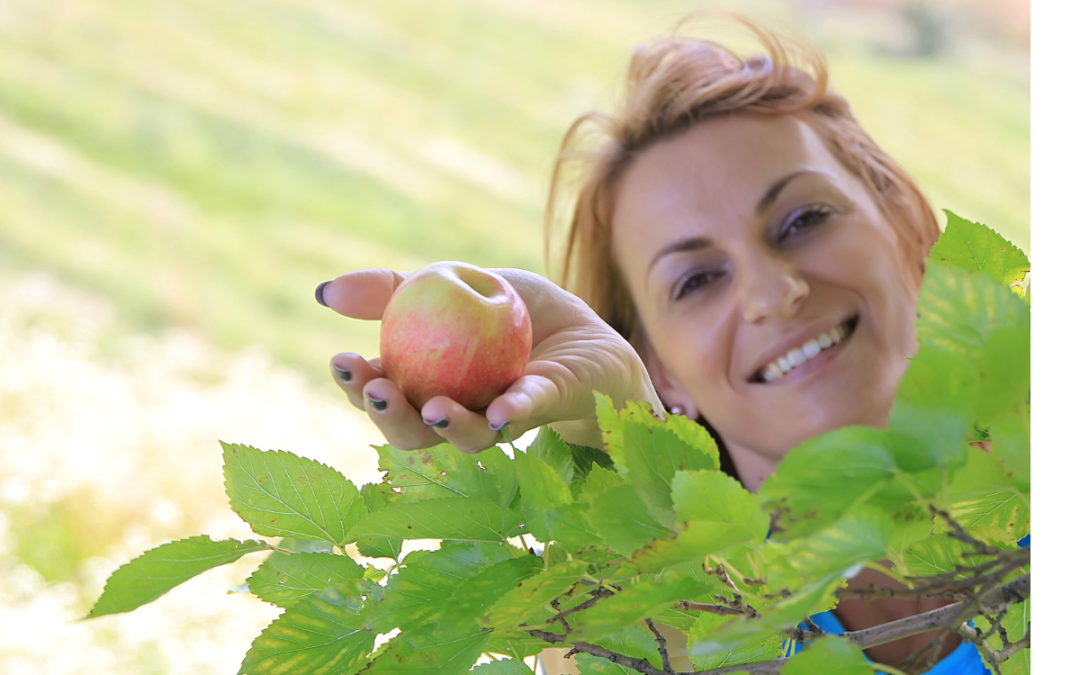Five years ago, I planted four apple trees in my yard. Honestly, I wasn’t sure how to take care of them, but I thought it would be fun to watch them grow. And grow they did—three of them shot up into fifteen-foot giants. Each spring, they’re covered in blossoms, and by fall, I’m picking hundreds of apples.
But the fourth tree? That one never grew. Every year, I doubted it would survive the winter. Though each Spring it sprouted a few leaves, but never blossomed. I thought maybe it just wasn’t meant to be.
And then this year, something changed. That little tree surprised me with three blossoms. From those blossoms came one apple. But not just any apple—a big, beautiful apple, twice the size of the others. I stood there amazed, holding it in my hand, realizing this tiny, struggling tree had produced something extraordinary.
That apple reminded me of an important truth: growth takes time, the right tools, and a whole lot of resilience. And for women in menopause, that lesson couldn’t be more important.
Why Resilience Matters in Menopause
Menopause can feel like that harsh Minnesota winter—long, cold, and unforgiving. Your body shifts, hormones fluctuate, and suddenly what used to work—whether diets, exercise routines, or even your sleep habits—no longer delivers the same results. You might feel like that little tree—slow to bloom, struggling against the elements, wondering if your best days are behind you.
But resilience is what helps us not just survive this season, but thrive in it. Research shows that women who cultivate resilience—through mindset, support, and self-care—experience fewer negative symptoms and greater overall well-being. It’s what allows you to bend without breaking, to adapt when your body feels unfamiliar, and to discover strengths you didn’t know you had.
The Three Keys: Time, Tools, and Mindset
The lessons from my apple tree apply directly to how we navigate menopause:
| Element | What the Tree Needed | What We Need in Menopause |
|---|---|---|
| Time | Years of patient growth before blossoming. | Your body is recalibrating. Healing, balance, and strength take time. Progress often shows up in inches, not miles. |
| Tools & Environment | Water, sunshine, good soil, protection from harsh winters. | Whole foods, rest, hormone support, movement, stress relief, and a supportive environment. Quick fixes no longer work—this is about consistent nourishment. |
| Mindset & Belief | The gardener believed in the tree’s potential when nothing showed. | You may feel discouraged, but a growth mindset keeps you engaged, learning, and adapting. It helps you trust that new energy and confidence are still possible. |
Carol Dweck’s growth mindset research shows that our abilities aren’t fixed—they expand with effort and belief. The same holds true in menopause. Alia Crum’s work on mindset reveals that how we think about stress and challenge can shift how our bodies respond to them physically. That’s powerful proof that what you believe about menopause matters.
What the Experts Say
-
“Resilience is our ability to bounce back from life’s challenges and unforeseen difficulties, providing mental protection from emotional and mental disorders.” ─ Jeremy Sutton, Ph.D.
-
“Life doesn’t get easier or more forgiving; we get stronger and more resilient.” ─ Steve Maraboli
-
“Resilience is accepting your new reality, even if it’s less good than the one you had before … then putting together something that’s good.” ─ Elizabeth Edwards
These insights echo the lesson my little tree taught me: resilience isn’t just bouncing back—it’s about growing stronger in a new reality.
The Bigger Outcome Waiting for You
Because I didn’t give up on that tree, it produced one extraordinary apple. That fruit is more than a fruit. It’s a reminder:
-
Small progress matters. Even if symptoms improve slowly, it’s still growth.
-
What seems delayed isn’t denied. Your breakthrough may take time, but it will come.
-
With patience and nourishment, your outcome can be bigger and more beautiful than expected: renewed energy, confidence, and joy.
Now imagine if I’d pulled up that tree after year three, assuming it wasn’t worth it. I would have missed the apple. Imagine if you give up on your own well-being in menopause, assuming change isn’t possible. You’d miss the incredible vitality waiting on the other side of resilience.
What Happens if You Don’t Act
I hate to be a Debbie Downer but if you don’t give yourself time, the right tools, or a supportive mindset, you risk:
-
Settling for symptoms that could improve.
-
Believing midlife decline is inevitable.
-
Missing out on the confidence and freedom that come with balance.
The good news? You don’t have to stay stuck.
How to Be the Gardener of Your Midlife
-
Plant the seed and tend it: Decide what you want—better sleep, more energy, or balanced moods. Intention is the first step.
-
Nourish yourself: Fuel your body with whole foods, movement, rest, and community. These are your sunlight and water.
-
Trust delayed blossoming: Inch-by-inch progress means your roots are strengthening. Don’t overlook it.
-
Reframe challenges: See hot flashes, weight gain, or stress as signals, not failures. They’re opportunities to respond differently.
-
Celebrate small fruits: Every win matters. Each one proves you’re moving toward your “big apple.”
Your Call to Action
Menopause isn’t the end of vitality—it’s the start of a new season. Like that little tree, you already have what it takes to bloom. With the right time, tools, and mindset, you can turn struggle into strength and produce results that surprise even you.
Are you ready to cultivate your resilience and discover your “big apple”? Let’s talk. Schedule a call today and let’s create your personalized path to thriving in menopause—because this is your season to grow, to flourish, and to soar.

